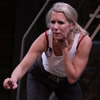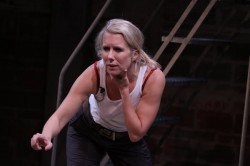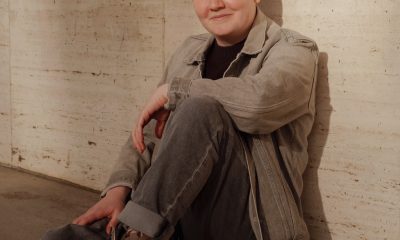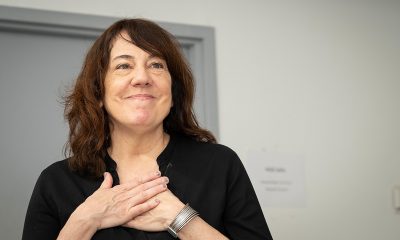Arts & Entertainment
Breaking all the rules
‘Hung’ star shines in one-woman Studio comedy show

‘Bust’
Through Dec 18
The Studio Theatre
1501 14th Street, NW
$35-$60
202-332-3300
studiotheatre.org
If you’re not yet familiar with comedic actress/writer/playwright Lauren Weedman, you need to be. Best known for her stint as a correspondent on “The Daily Show” and playing Horny Patty on HBO’s “Hung,” Weedman is hilarious.
In her mostly autobiographical, one-woman show “Bust” — now at the Studio Theatre — Weedman revisits her real-life experience as a volunteer in a Los Angeles women’s jail. Playing all the parts (inmates, guards, friends, other volunteers, a Manhattan magazine editor and herself), Weedman wittily juxtaposes her time navigating the labyrinth-like, ridiculously bureaucratic correctional system with her equally surreal life as a working actress in L.A.
The way Weedman portrays herself (manic, insecure, largely self-absorbed but coming from a good place), she couldn’t be less suited to volunteer for an inmate buddy program called Beyond Bars. After arriving late and disrupting orientation, she goes on to break every one of the group’s rules. In her first meeting with the prisoners she’s come to help, she reveals her home address, details of her sex life and makes promises she can’t possibly keep (all big no-nos). She’s fairly neurotic, entirely without filter and boy oh boy, is it funny.
Not surprisingly, “Bust’s” authority figures particularly dislike her. The earnest orientation leader assumes (not wholly unwarrantedly) that Weedman is high on cocaine and during the initial jailhouse tour, a seasoned Chicano guard informs her that all those incessant wisecracks will get her killed. She spends a lot of time apologizing all over the place for what’s just popped out of her mouth.
Ably directed by Allison Narver, it’s a fast-paced 90 minutes. There is no set. Other than a rolling ladder and a rolling stool, the stage is empty. Dressed in a white wife beater and black pants, the 40-ish blond actress seamlessly changes from person to person. Not a lot of actors can inhabit more than a dozen characters of varied gender, ethnic background and class with Weedman’s same dazzling incisiveness. Whether it’s a tweaked-out inmate, abusive TV commercial director or the wise senior volunteer named Irene, she’s dead-on.
Toward the beginning of the play when the volunteers share their reason for being there, the Weedman character says she wants to get outside of herself, to think of something other than her weight. Then she lets slip out that she also thought, perhaps, inside jail she might stand a chance at being the prettiest girl in the room. She’s then quick to add that she’s straight — almost entirely so.
Though she does TV and increasingly more feature films, Weedman continues to make time for solo performances. Mined from her life, the plays sometimes contain gay and lesbian characters. In interviews Weedman references gay friends and jokes about how casting agents typically see her as the lesbian sidekick. She has an LGBT following.
Hers is a self-deprecating, smart, outrageous and occasionally silly humor. She simultaneously finds a lot of madness and some meaning in her life. Just when her onstage self becomes discouraged by the prisoners’ self-defeating behavior and afraid that she’s been a totally ineffective volunteer, a prisoner sincerely thanks Weedman for making all those weekly visits. It’s an extremely poignant moment. And then it’s back to more laughs.

Team DC, the umbrella organization for LGBTQ-friendly sports teams and leagues in the D.C. area, held its annual Night of Champions Awards Gala on Saturday, April 20 at the Hilton National Mall. The organization gave out scholarships to area LGBTQ student athletes as well as awards to the Different Drummers, Kelly Laczko of Duplex Diner, Stacy Smith of the Edmund Burke School, Bryan Frank of Triout, JC Adams of DCG Basketball and the DC Gay Flag Football League.
(Washington Blade photos by Michael Key)




















The 2024 National Cannabis Festival was held at the Fields at RFK Stadium on April 19-20.
(Washington Blade photos by Michael Key)
















Covering the @NatlCannaFest at RFK Stadium for @WashBlade . Stop by the LGBTQ+ booth and pick up a paper if you are here. pic.twitter.com/is7hnsaPns
— Michael Patrick Key (@MichaelKeyWB) April 20, 2024
Theater
‘Amm(i)gone’ explores family, queerness, and faith
A ‘fully autobiographical’ work from out artist Adil Mansoor

‘Amm(i)gone’
Thorough May 12
Woolly Mammoth Theatre
641 D St., N.W.
$60-$70
Woollymammoth.net
“Fully and utterly autobiographical.” That’s how Adil Mansoor describes “Amm(i)gone,” his one-man work currently playing at Woolly Mammoth Theatre.
Both created and performed by out artist Mansoor, it’s his story about inviting his Pakistani mother to translate Sophocles’s Greek tragedy “Antigone” into Urdu. Throughout the journey, there’s an exploration of family, queerness, and faith,as well as references to teachings from the Quran, and audio conversations with his Muslim mother.
Mansoor, 38, grew up in the suburbs of Chicago and is now based in Pittsburgh where he’s a busy theater maker. He’s also the founding member of Pittsburgh’s Hatch Arts Collective and the former artistic director of Dreams of Hope, an LGBTQ youth arts organization.
WASHINGTON BLADE: What spurred you to create “Amm(i)gone”?
ADIL MANSOOR: I was reading a translation of “Antigone” a few years back and found myself emotionally overwhelmed. A Theban princess buries her brother knowing it will cost her, her own life. It’s about a person for whom all aspirations are in the afterlife. And what does that do to the living when all of your hopes and dreams have to be reserved for the afterlife?
I found grant funding to pay my mom to do the translation. I wanted to engage in learning. I wanted to share theater but especially this ancient tragedy. My mother appreciated the characters were struggling between loving one another and their beliefs.
BLADE: Are you more director than actor?
MANSOOR: I’m primarily a director with an MFA in directing from Carnegie Mellon. I wrote, directed, and performed in this show, and had been working on it for four years. I’ve done different versions including Zoom. Woolly’s is a new production with the same team who’ve been involved since the beginning.
I love solo performance. I’ve produced and now teach solo performance and believe in its power. And I definitely lean toward “performance” and I haven’t “acted” since I was in college. I feel good on stage. I was a tour guide and do a lot of public speaking. I enjoy the attention.
BLADE: Describe your mom.
MANSOOR: My mom is a wonderfully devout Muslim, single mother, social worker who discovered my queerness on Google. And she prays for me.
She and I are similar, the way we look at things, the way we laugh. But different too. And those are among the questions I ask in this show. Our relationship is both beautiful and complicated.
BLADE: So, you weren’t exactly hiding your sexuality?
MANSOOR: In my mid-20s, I took time to talk with friends about our being queer with relation to our careers. My sexuality is essential to the work. As the artistic director at Dreams of Hope, part of the work was to model what it means to be public. If I’m in a room with queer and trans teenagers, part of what I’m doing is modeling queer adulthood. The way they see me in the world is part of what I’m putting out there. And I want that to be expansive and full.
So much of my work involves fundraising and being a face in schools. Being out is about making safe space for queer young folks.
BLADE: Have you encountered much Islamophobia?
MANSOOR: When 9/11 happened, I was a sophomore in high school, so yes. I faced a lot then and now. I’ve been egged on the street in the last four months. I see it in the classroom. It shows up in all sorts of ways.
BLADE: What prompted you to lead your creative life in Pittsburgh?
MANSOOR: I’ve been here for 14 years. I breathe with ease in Pittsburgh. The hills and the valleys and the rust of the city do something to me. It’s beautiful, it’ affordable, and there is support for local artists. There’s a lot of opportunity.
Still, the plan was to move to New York in September of 2020 but that was cancelled. Then the pandemic showed me that I could live in Pittsburgh and still have a nationally viable career.
BLADE: What are you trying to achieve with “Amm(i)gone”?
MANSOOR: What I’m sharing in the show is so very specific but I hear people from other backgrounds say I totally see my mom in that. My partner is Catholic and we share so much in relation to this.
I hope the work is embracing the fullness of queerness and how means so many things. And I hope the show makes audiences want to call their parents or squeeze their partners.





















